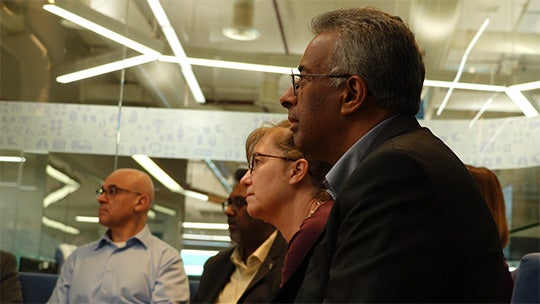Rice University is extending its global reach through a bold initiative to foster advanced educational partnerships and innovation-driven research in one of the world’s fastest-growing education and technology markets: India. With an initial office in Bengaluru as well as satellite offices strategically located throughout India, Rice Global India serves as the university’s incubator for developing research and innovation partnerships and advanced educational exchange with diverse industries and academic communities throughout the country.
“India’s culture is based on education and the rise of different economic strata so that they can advance themselves,” said Paul Cherukuri, Rice’s vice president for innovation.

As India’s influence grows in fields such as climate change, biotechnology and artificial intelligence (AI), Rice is positioning itself to be a key collaborator. These priorities reflect the university’s long-term global ambitions as outlined in its strategic plan Momentous: Personalized Scale for Global Impact.
“We really envision a dynamic and fast-moving set of collaborations across every sector that matters to the university,” said Caroline Levander, vice president for global.
“We need to establish partnerships and establish Rice’s credibility by making sure that people understand that we are a very serious research and teaching university,” said Ramamoorthy Ramesh, executive vice president for research. “We aspire to be the best in both of those aspects.”
At the heart of these efforts is a shared commitment to education. Rice Global India builds upon partnerships started in 2020 with the Indian Institute of Technology Kanpur (IITK) and the founding of a joint Energy Materials Institute. In 2023, the collaboration expanded with two formal strategic partnership agreements — one with IITK and one with the Indian Institute of Science (IISc) — laying the foundation for advanced research initiatives and faculty and student exchange.
“What we see is remarkable ambition on those university campuses and an appetite to work with Rice University in a number of ways,” Levander said. “We’re following up already with IIT Madras and IISc on next steps. We are exploring new partnerships with Indian Institute of Technology Hyderabad as well as other IITs.”

These initiatives are more than symbolic. The Rice-IISc and Rice-IITK Strategic Collaboration Awards have been established to facilitate and support joint research initiatives in high-impact areas including sustainable energy, AI and biotechnology. The goal is to create meaningful academic and societal impact through multidisciplinary, cross-cultural collaboration.
“In terms of our presence there, the impact that we can have in terms of science, technology and development but also from a perspective of social justice for different technologies, it’s going to be massive for Rice,” said Aditya Mohite, the William Marsh Rice Trustee Professor of Chemical and Biomolecular Engineering and director of the Rice Engineering Initiative for Energy Transition and Sustainability.
For faculty and administrators who traveled to India in November as part of the most recent Rice delegation, the trip was a turning point.
“I do think we have a leapfrog moment ahead of us,” Cherukuri said.
The enthusiasm from Rice faculty reflects the growing recognition that global challenges require global collaboration. Engineering and computing, for instance, are areas where the stakes are high and the need for innovative solutions is urgent.
“When we look at global health, when we look at energy transition and sustainability, when we look at computing, when we look at water technology, these are issues that touch everyone around the world,” said Luay Nakhleh, the William and Stephanie Sick Dean of Engineering and Computing. “So it’s very important that we take an international approach to the solution as well.”

“India represents a tremendous opportunity for all of Rice but especially for the natural sciences,” said Thomas Killian, dean of the Wiess School of Natural Sciences. “They’ve been investing a great deal in their research institutes and their universities, and there already are a lot of academic collaborations with them, and we see many opportunities to grow that.”
The expansion is also about people. Relationships between institutions are forged by the individuals who connect on campuses, at innovation hubs and in conversation across time zones.
“I really think this is going to be a great thing for Rice,” Killian said. “I expect that we’ll really be able to make something special out of it.”
What unites these efforts is a shared vision for international academic exchange — one in which Rice students and faculty engage directly with partners on the ground in India and Indian students and researchers bring their expertise and aspirations to Rice.
“There’s a vast archive and wealth of positive feelings about Rice sprinkled throughout that country, that big, dynamic, multicity, multiregion country,” Levander said. “We’re going to be wrapping our arms around that over these next years, and it’s going to be quite an adventure.”

